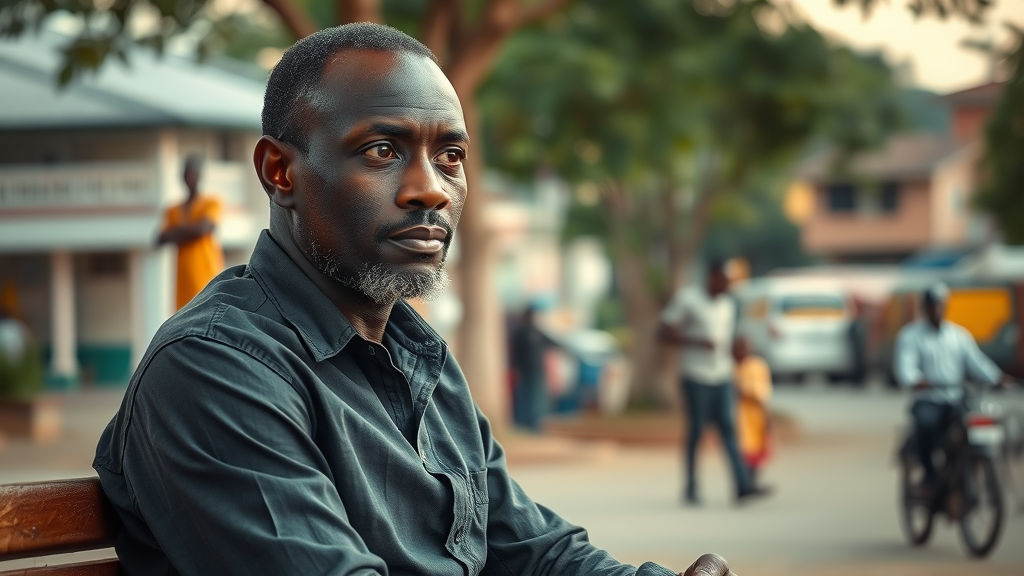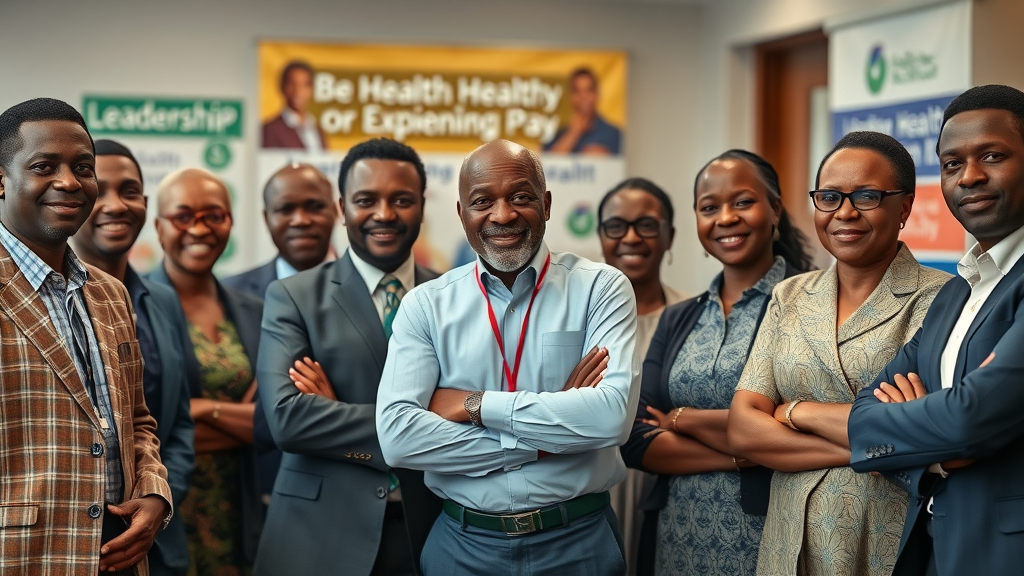It’s time to break the silence: Ugandan men live an average of 7 years less than women, and many of these deaths are preventable. Real leadership isn’t just about providing for your family, it’s about protecting your health so you can truly be there for those who depend on you. This article confronts the taboos, offers expert-backed guidance, and challenges the myths standing in the way of a longer, stronger life for every Ugandan man.
What You'll Learn About Men's Health in Uganda
Key statistics on men's health outcomes in Uganda: Discover eye-opening facts about early mortality and disease patterns.
Why regular medical checkups show strength, not weakness: How routine health screenings are acts of leadership and resilience for Ugandan men.
The silent threats: Learn how hypertension, diabetes, and prostate health quietly endanger men’s futures and families.
How Case Clinic’s male-focused services support Ugandan men and their families: Community-centered, confidential care.
-
Steps to schedule your essential health screening: Start your action plan now.

A Reality Check: Men's Health Uganda in Numbers
"Ugandan men have a 7-year lower life expectancy than women – many deaths are preventable with early checks." – Uganda Ministry of Health
According to the Ministry of Health, over 1 in 4 Ugandan men suffer from hypertension, often undiagnosed until a crisis hits.
Diabetes rates among Ugandan men are climbing fast, especially in urban areas like Kampala where lifestyle risk factors multiply.
Prostate cancer is now one of the top causes of cancer-related death in older Ugandan men, but late detection remains common.
Condition |
Ugandan Men |
East African Average |
|---|---|---|
Hypertension Prevalence |
27% |
25% |
Diabetes Prevalence |
6% |
5% |
Prostate Cancer Incidence (age 40+) |
120/100,000 |
110/100,000 |
Average Life Expectancy (Male) |
59 years |
61 years |
The Silent Crisis: Why Many Men in Uganda Avoid Healthcare
It’s no secret that many Ugandan men only visit the clinic when illness becomes impossible to ignore. This delay comes at a steep price, not just for individuals but for their families and the communities that rely on them. Recent findings reveal that fear of diagnosis often outweighs the actual risk of disease, with social expectations, work stress, and concerns about financial stability fueling avoidance.
In Uganda, the traditional role of provider claims significant weight. Men are seen not just as breadwinners, but as pillars of emotional and physical support. For many, the idea of taking time off for “minor” issues feels like letting their families down or risking their career prospects. This cycle of silence, amplified by stigma and misconceptions, results in many cases where men only seek medical attention at crisis points, too late for simple interventions.
Provider Responsibility: Family & Work Impact – Men's Health Uganda
Pressure to provide financially and emotionally: Ugandan men often shoulder the expectations of family welfare and workplace reliability. An untreated illness can mean lost income, mounting stress, and diminished family security.
Economic impact of illness on Ugandan families: Health crises can devastate savings or push families into prolonged poverty. When men avoid seeking care, small problems can escalate into serious, costly conditions.
"Many Ugandan men fear a diagnosis more than the disease itself – but early action prevents tragedies." – Case Clinic Internal Medicine Specialist
Breaking the Silence: Stigma and Masculinity in Men's Health Uganda
Common misconceptions about strength and silence: Real strength doesn’t mean “suffering in silence.” Health experts and respected elders increasingly affirm that responsible men set the example by seeking timely care and support.
Cultural and workplace barriers to seeking help: From old beliefs in “keeping strong” to fears of discrimination at work, many factors discourage open conversation about men’s health. The effect is especially hard on young men entering the workforce and older providers nearing retirement.
How different age groups and social positions experience stigma: Married men, young professionals, and elder statesmen all face differing pressures, but all have powerful reasons to protect their health for those who count on them.

The Real Threats to Ugandan Men's Health: Hypertension, Diabetes, and Prostate Issues
Hypertension Treatment Case Clinic: The 'Silent Killer'
Prevalence and local risk factors: Urbanization, high salt diets, stress, and family history have driven hypertension rates up among Ugandan men. Many men are unaware they even have high blood pressure.
Symptoms (or lack thereof) and the importance of screening: Hypertension rarely causes symptoms early on. Only a simple test at clinics like Case Clinic reveals danger before disaster, highlighting the need for regular checks, especially in cities like Kampala.
Long-term consequences for family providers: Ignored, hypertension can lead to heart attacks, strokes, and kidney failure. These complications not only endanger life but also remove the provider from his essential family and community roles.
Case Clinic success story: One 48-year-old business owner discovered severe hypertension during a free Case Clinic workplace screening. With regular follow-up and medication, he avoided serious illness and continues to support his staff and family today.
Diabetes: The Hidden Danger in Men's Health Uganda
Rising rates and why men are especially vulnerable: Sedentary jobs, increased sugar consumption, and genetic factors mean more Ugandan men are developing type 2 diabetes every year.
Warning signs and importance of annual fasting blood sugar tests: Early diabetes often causes only mild symptoms, such as fatigue or increased thirst. Routine tests, fasting blood sugar, at Case Clinic detect problems before damage is irreversible.
Testimonial: “When my blood sugar shot up, I nearly lost my business from repeated absences. Case Clinic taught me how to manage my diabetes; now, I’m healthier, focused, and my business is thriving.”
Prostate Screening Kampala: Safeguarding Future Generations
Incidence of prostate cancer and benign enlargement: Men over 40 in Uganda face one of the highest prostate cancer rates in the region, along with benign prostate issues that can affect urination and quality of life.
Recommended screening timeline: All men should consider prostate screening from age 40, especially those with family history or symptoms such as difficulty urinating.
Personal account: One Case Clinic patient, a retired teacher, credits his early prostate screening for a full recovery and years of healthy retirement: “Early intervention made all the difference.”
Economic effect of late diagnosis: Treating advanced prostate cancer is far costlier than early detection. Prolonged illness affects not only men but also the ability of entire families to thrive and plan for the future.
Watch: Why Every Ugandan Man Needs Regular Health Checks – A Case Clinic specialist explains the importance of timely screening for hypertension, diabetes, and prostate health, featuring stories from local men and practical takeaways. (Video available at casemedcareservices.org)
Leadership Through Health: Why Seeking Help Is Strength
Reframing health checkups as responsibility, not weakness: Real leaders don’t gamble with their future. Prioritizing checkups delivers stability for partners, children, and businesses. When respected men speak openly about their health, they inspire their teams and communities to do the same.
Testimonies from respected leaders: Notable community leaders and executives in Kampala have shared how annual health checks at Case Clinic enabled them to recover quickly and return to leading with energy and confidence.
Supporting staff and business productivity: Healthy men are better leaders at home and in the workplace. Regular checkups reduce absenteeism and boost morale, proving that strength lies in prevention, not denial.

Case Clinic's Male-Friendly Approach: Leading the Way in Men's Health Uganda
How Case Clinic Supports Men’s Health Uganda
Confidential, culturally sensitive care: Every man receives respectful, private consultations tailored to his background and beliefs.
Male-centered health education and counseling: Doctors and counselors speak directly to men’s responsibilities and challenges, building trust.
Comprehensive screening for hypertension, diabetes, and prostate health: Case Clinic covers all essential men’s health needs under one roof, including cutting-edge diagnostic tools.
Business leader and workplace partnership programs: Flexible checkup plans and education events for employers determined to safeguard their teams.
Case Clinic Success Stories: Men's Health Uganda in Action
Samuel (entrepreneur, 55): “Case Clinic caught my high blood pressure early. With their help, my children still have a healthy, strong father. My business is secure, and so is my legacy.”
Moses (public servant, 44): “Diabetes almost forced me into early retirement. After Case Clinic’s intervention, I learned how to manage my health while still providing for my family.”
David (retired teacher, 68): “Prostate screening was simple and private. Preventive care gave me years back to enjoy with my grandchildren.”
"Case Clinic gave me the courage to act early. Now my family depends on me – and I feel strong again."

Your Health Action Plan: Next Steps for Every Ugandan Man
-
Checklist: When & how often to get checked
Hypertension: Every year from age 20+
Diabetes: Annual fasting blood sugar from age 35+ (younger if risk factors present)
Prostate Health: Screening every 2 years from age 40+
How to schedule tests at Case Clinic: Call, walk-in, or book online at https://casemedcareservices.org
-
What to expect – your step-by-step experience:
Registration and private consultation
Quick, non-invasive screening tests
Same-day results and a clear action plan
Affordable care and insurance options: Flexible payment plans and coverage accepted. Ask about special men’s health packages.

Key Takeaways: Men’s Health Uganda & Real Leadership
Regular checkups empower Ugandan men as leaders, both at home and in business.
Seeking help is a sign of strength and responsibility, not weakness.
Case Clinic is a trusted, proven partner for men’s health in Uganda.
People Also Ask: Men's Health Uganda
Why are regular checkups important for men in Uganda?
Regular checkups catch silent killers like hypertension, diabetes, and prostate issues early, allowing prompt treatment and protecting family welfare. Many of these conditions go unnoticed until they cause serious problems, so routine screenings are crucial to keeping Ugandan families safe and secure.
What is the recommended age to start prostate screening in Kampala?
Ugandan men should consider prostate screening from age 40, especially if there is a family history or symptoms present. Catching changes early means better outcomes and peace of mind for years to come.
How does hypertension treatment at Case Clinic benefit Ugandan men?
Case Clinic provides early detection, ongoing management, and education tailored to men’s work and family demands. Treatments are confidential, effective, and enable men to continue fulfilling their roles as providers and leaders.
Can health issues affect a man's ability to provide for his family?
Yes, untreated medical conditions can cause loss of income and emotional strain, impacting whole families. Early detection and management safeguard not only personal health but also the financial stability of Ugandan households.
FAQs: Men's Health Uganda
What are the main health threats for Ugandan men?
Hypertension, diabetes, and prostate diseases are the leading risks, often developing without symptoms. Regular checkups are key for early intervention.How can I schedule a checkup at Case Clinic?
Visit casemedcareservices.org, call, or walk in to book your personalized screening today.Does health insurance cover men's health screening?
Yes, most insurance plans accepted; affordable package rates also available. Inquire directly with the clinic for your options.Are Case Clinic services private and confidential?
Absolutely. Confidentiality and respectful, private care are central to all Case Clinic men’s health services.

Conclusion: Men’s Health Uganda – Act Like a Provider, Lead Like a Leader
Acknowledging stigma is the first step to strength
Commit to regular checkups: for family, community, and self
Take action today with Case Clinic and protect your legacy
"Taking care of your health is taking care of your family – that’s real manhood in Uganda today."
Take Charge of Your Health: Discover Case Medcare Services Uganda
Schedule your health checkup at https://casemedcareservices.org today
 Add Row
Add Row  Add
Add 


Write A Comment